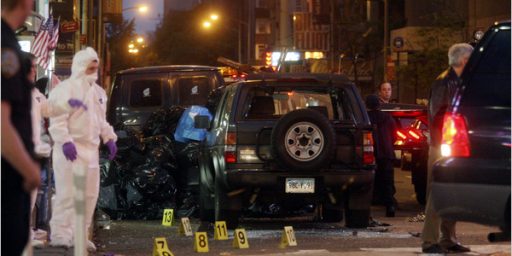FBI Sting Operation Nabs Another Supposed Terrorist
A Bangladeshi man was arrested yesterday in New York for an apparent plot to bomb Federal Buildings. The entire plot was an FBI sting operation.
The FBI has netted another apparent potential terrorist:
Federal prosecutors in Brooklyn charged a 21-year-old Bangladeshi man with conspiring to blow up the Federal Reserve Bank of New York, saying he tried to remotely detonate what he believed was a 1,000-pound bomb in a van he parked outside the building in Lower Manhattan on Wednesday.
But the entire plot played out under the surveillance of the Federal Bureau of Investigation and the New York Police Department as part of an elaborate sting operation, according to court papers.
The man, Quazi Mohammad Rezwanul Ahsan Nafis, who arrived in the United States in January on a student visa, tried to make contacts and recruit people to form a terrorist cell to help him carry out an attack, according to a criminal complaint in the case. But one of these recruits was an F.B.I. informer, who later introduced him to an undercover F.B.I. agent who helped him with the plot.
Mr. Nafis was charged with conspiring to use weapons of mass destruction and providing material support to Al Qaeda. He could face up to life in prison if convicted.
Mr. Nafis arrived at Federal District Court in Brooklyn, looking boyish despite his trim beard. He spoke quietly when answering the questions of the magistrate judge, Roanne L. Mann.
The plot is the latest to fit a model in which, in the process of flushing out people they believe present a risk of terrorism, federal law enforcement officials have played the role of enabler. Agents and informers have provided suspects with encouragement, guidance, money and even, the subjects of the sting operations are led to believe, the materials needed to carry out an attack. Though these operations have almost always held up in court, they have come under increasing criticism from those who believe that many of the subjects, even some who openly espoused violence, would have been unable to execute such plots without substantial assistance from the government.
Both F.B.I. leaders and federal prosecutors have defended the approach as valuable in finding and stopping people predisposed to commit terrorism.
We’ve seen many cases like this over the past decade. Some guy who is mostly a loner ends up going on some random “jihadist” website that ends up being an FBI honeypot, and they get dragged into a conspiracy to commit a terrorist act that is, in reality, an FBI sting operation. In all of these cases, one is left wondering if any of these people would have actually ever done anything if they had not been but in contact with an FBI agent.
I’ve written about this topic before — see here and here — and what I said then applies now. I really have to wonder about the seriousness of our anti-terror efforts when resources are expended in a massive effort to entrap one guy who may or may not have actually done anything if he hadn’t happened to run into an FBI sting operation. Legally, it doesn’t constitute entrapment because it doesn’t necessary constitute luring someone into committing a crime that they otherwise would not have committed. However, it seems to me that it constitutes a form of practical entrapment to the extent that it seems rather apparent that almost none of the people who have been caught up in operations like this would have actually ever been able to carry out anything resembling a terrorist attack without the assistance of their FBI “co-conspirators” seems rather low.
In each of the cases of this type that have become public, the suspect in question what under the control, unbeknownst to them, of FBI agents who were carefully directing them toward committing the necessary acts that would allow them to be charged with a crime. At no time were any of them an actual danger to the public. Had they been left alone, it’s entirely possible that they would’ve spent their lives as resentful and hateful people, but being a resentful and hateful and hateful person isn’t a crime. In that respect, I really have to wonder what we are accomplishing with these types of law enforcement operations. After all, if there really are terrorist cells operating the the United States — and that is a big if — these types of operations aren’t likely to uncover them.
Adam Clark Estes raises this point:
Our first reaction was a simple one: “Yea, we caught a terrorist!” And then we started thinking, “Wait a second — it seems like the FBI had a lot to do with planning this fake attack.” Which leads to, “Would this terrorist have actually built this bomb and delivered it to the Fed’s doorstep if the FBI hadn’t walked him through the process?” This question inevitably leads to one thinking, “What they hell am I thinking? This guy wanted to ‘destroy America,’ ” and he didn’t thanks to the FBI.” Then, maybe your mind might wander into patriotic territory, “Maybe I should join the FBI and fight terrorists, too.
(…)
If the FBI both planned and thwarted a terrorist attack, who’s the hero? This is up for debate, and until we know more about what happened in this latest failed attack, we won’t know exactly how determined Nafis, the suspected terrorist, was about destroying America.
We’ve seen this kind of things many times before. Back in 2009, Hosam Maher Husein Smadi, a 19 year old Jordanian immigrant was arrested in connection with a plot to bomb a Dallas skyscraper. In October 2010, a Pakistani born American citizen was arrested for plotting to carry out terror attacks on the D.C. subway system, also as the result of an FBI sting operation. The following month, the FBI nabbed 19-year-old Mohamed Osman Mohamud, a Somali-American who thought he was engaging in a conspiracy to detonate a bomb during the lighting of the public Christmas Tree in Portland, Oregon thanks to a sting operation. And, last September, an FBI sting operation ensnared Rezwan Ferdaus in a plot to bomb targets in the Washington, D.C. area. In all cases, the actions taken in furtherance of the alleged terrorist conspiracies were done under the surveillance of agents posing as terrorist sympathizers. In none of the cases was there evidence that any of these men had taken any steps toward committing an act of terrorism prior to being put in contact with the “terrorists” who were actually FBI agents.
Of course, as I noted two years ago, there is another value to sting operations like this:
We’ve seen many of these types of cases in the years since the September 11th attacks. A wanna-be terrorist makes contact with what he believes to be an agent of al-Qaeda and then proceeds to engage in acts that would clearly constitute a criminal conspiracy to commit terrorism. Throughout the whole process, though, he’s actually under the control of the FBI or proceed to lead him down a road that causes him to incriminate himself in word and deed. Most of these cases end in an arrest long before any overt act takes place. Last month for example, a Virginia man was arrested for plots against the D.C. metro system at a point where all he had actually done in terms of overt acts was take a few photographs of Metro stations. In this case, though, the FBI let the case go to the point where they actually helped Mohamud construct a fake bomb and delivering it to the scene of the Christmas Tree lighting. For those like Greenwald who view these types of arrests as more a public relations stunt than actual law enforcement, the Oregon incident seems to be strong evidence in their favor. What better way for the FBI to look like the hero than by stopping a “terrorist plot” (that wasn’t really a terrorist plot) directed at America’s holiday celebrations? It’s a plot development straight out of 24, but what’s unclear is whether it actually accomplishes anything.
The FBI and the NYPD got some great press out of this arrest, and Mr. Nafis is going to be spending a lot of time in Federal Prison, which under the law he deserves. What I have to wonder, though, is whether this is a wise use of law enforcement resources, or a publicity stunt.







I suppose it is possible, but what about the fact that this guy signed off on the plot? Should we still give him the benefit of the doubt on that one?
Bottom line is that if someone comes asking you –especially the FBI– to join a terrorist plot, the only acceptable answer is “Get the F outta here.”
Not, “Well, lemme think about it.”
If the guy would not have done anything if the FBI didn’t come along and try to set him up, then I have a problem with entrapment. If he came of his own free will to the FBI informant, then I would have no problems with it.
@DC Loser: From the article:
If that account is even half-correct, it was Nafis’s idea.
I tend to agree with Doug on this. If left to their own devices most of of these yahoos, foreign and domestic, will end up in a bunker in Khost or Idaho cackling to themselves.
There are two separate issues here.
There’s no question in my mind that this guy committed crimes, and he’ll be going to jail for that.
I don’t have much sympathy for him.
My question is whether this is a judicious use of our counter-terrorism resources
it’s a good point but then, he did pull the trigger knowing what was supposed to happen. some muslim guy did in in dallas too, he’s enjoying life behind bars now too.
If the article is correct that he came here and began trying to contact AQ and recruit others to perform some act of terror, then I’m pretty happy with the FBI snaring him. Playing him on this possibly gave them leads on a bunch of other potential troublemakers and, if the guy had any AQ connections, could have lead to disbanding a cell that was not at all harmless.
I don’t really see this as that much different from the way we’ve dealt with organized crime or various violence-prone hate groups.
@Doug Mataconis:
Compared to what? Picking through piles of rubble looking for clues?
I personally like that terrorists must wonder if their terrorist contacts might be FBI plants. I also like that the FBI has been making these guys go through the motions of setting off the fake bomb. If I was on the jury, I’d be very reluctant to acquit based on that, and I’d also be reasonably sure that they didn’t ensnare an otherwise innocent person.
Seems like this is a pretty good strategy. Much better than trying to build a case after the bomb goes off.
The utility of the publicity stunt:
It makes wannabe terrorists much more suspicious and likely to seek out help to carry out their attacks. If each of them assumes everyone’s an FBI plant, that’ll make their task more difficult.
Inhibiting cooperation amongst terrorists is a worthy achievement.
Pre-9/11 counter-terrorism was a ticket to Nowheresville from a career standpoint. That’s changed now and when finding terrorists will advance careers, find them they will.
I agree with Herb and Geek, the value of a campaign where the person whom the terrorist thought was helping him was actually an FBI agent is that potential terroists will be unlikely to seek help in their attempts, making such attempts less likely to succeed and necessarily smaller plots.
Well, this is exactly the same philosophy employed by the Stasi to monitor all East Germans for possible anti-regime actions, just sayin’.
@DC Loser:
That’s like saying clipping fingernails is like amputating a limb.
Me, I heard some guy tried to blow up the Federal Reserve, and assumed he was a Ron Paul fan. Mea culpa.
It’s getting to the point that wannabe terrorists are like teens who want to have sex with older ugly men and hit men for hire — almost every one you find is really an undercover cop.
And that’s a good thing. It sows paranoia among the would-be bad guys as they wonder who might be an informant, and I like that.
This is also a huge step up from the underwear bomber and the Times Square bomber, both of whose plots failed only due their own incompetence.
And note: this is how you run a sting. Any resemblance to Operation Fast & Furious, the gun-running scheme falsely called a “sting,” is totally coincidental.
This sort of post only can exist on college campuses and on the Internet. Seriously.
The Feds nab a guy who wanted to bomb a building and kill a lot of people and on the Internet they’re concern-trolling about whether the attendant sting operation was a useful allocation of law enforcement dollars. Great.
Then what takes it all the way to fully dissonant is that in the very next breath the same people will say that we shouldn’t engage in profiling at airports, that we shouldn’t engage in warrantless wiretapping, that we shouldn’t waterboard terrorists to find out exactly what they know and don’t know, and of course that even if we catch a foreign terrorist in another country overtly engaging in terrorism that we should treat him like any common criminal and give him a civilian trial, as opposed to a military trial, or to indefinite detention, or to a summary execution on the battlefield. So in other words no matter what the government would try to do to thwart or to punish terrorism the Internet-academe left reflexively will complain about it.
The political left might eventually be the death of us. Literally.
@Moosebreath:
You are assuming that real terrorists are as dumb in picking their help as this 21-year old kid. That’s a silly assumption to make. The point is not to arrest brown people. It’s not to arrest brown people who say stupid things about doing violence, though that is a great way for an agent to get promoted. It’s to stop actual violence from happening, and it’s not at all clear that this 21 year old actually possessed the means to cause any harm.
@Tsar Nicholas:
I am with you up to the last paragraph. What on earth makes you think that Doug, as the author of this post, is of the political left?
@swbarnes2:
Whether _this_ person had the means to cause harm is also not the point. The point is to make people who in the future are thinking of causing harm less willing to seek help, because that stranger that the meet in a chat room might be an FBI agent. Given how many plots have been foiled in this manner in the last few years, it seems many potential terrorists (note, not “brown people” — really WTF?) are as “dumb” as this person.
@swbarnes2:
This dude parked the van outside the building and detonated the “bomb.” .
That’s not “saying” anything. Means to cause harm? Provided the means, he pushed the button.
Sets the standard, I think.
@Doug Mataconis:
My question is whether this is a judicious use of our counter-terrorism resources.
It’s a good question without an easy answer for us citizens, seeing as how we know very little about how counter-terrorism resources are used.
@Tsar Nicholas: Is it the political left who was squawking that we didn’t drag Bin Laden back to the US and put him under trial? I thought it was no one, except maybe a few clueless lawyers on both sides.
@Herb:
I’m not questioning his intentions or desires, I’m questioning his ability to cause harm, because if that was nil, then building this elaborate deception to get him to act on his intentions is a poor use of resources.
What makes Americans safer is stopping people who have bombs, not ‘bombs’. This guy got his ‘bomb’ from the FBI, that in no way demonstrates that he was capable of getting a bomb from anywhere or anyone. I don’t care what’s in his heart, I don’t want the FBI spending all its resources making sure that everyone in the country who has hateful, muderous desires in their heart is thrown in prison. I want them to stop the people who are actually capable of causing harm. Someday, someone might get through with a real, honest to goodness bomb. And then the country will be wondering why so many FBI agents were spending their time LARPing with stupid 20-year olds, instead of investigating the guys who actually had access to weapons and bombs.
@swbarnes2:
This is why they went through the trouble of having him detonate a fake bomb. They did not just look into his heart and declare it murderous.
And LARPing with “stupid 20 year olds?” Sorry, but that just strikes me as tremendously ignorant, not only as a description of this case, but also of Al Qaeda’s methods.
The thought that someone who comes to this country to do harm has to be paranoid that anyone he deals with trying to put an attack together might be an FBI agent does not keep me awake at night.
@swbarnes2: Except that if you leave people who detonate “bombs” alone, there is the definite risk that they will detonate bombs as well. How difficult is it go get your hands on some ammonium nitrate?
You people are all ignoring the only crucial fact here: Exactly how long did it take the Obama administration to refer to this as a terrorist act? Because I think we should impeach the Kenyan if he didn’t utter the word immediately.